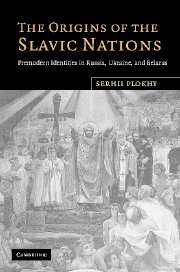Crossref Citations
This Book has been
cited by the following publications. This list is generated based on data provided by Crossref.
2009.
Imperial Boundaries.
p.
1.
2009.
Imperial Boundaries.
p.
117.
Ness, Immanuel
2010.
The International Encyclopedia of Revolution and Protest.
p.
1.
White, Stephen
McAllister, Ian
and
Feklyunina, Valentina
2010.
Belarus, Ukraine and Russia: East or West?.
The British Journal of Politics and International Relations,
Vol. 12,
Issue. 3,
p.
344.
Buhr, Renee L.
Shadurski, Victor
and
Hoffman, Steven
2011.
Belarus: an emerging civic nation?.
Nationalities Papers,
Vol. 39,
Issue. 3,
p.
425.
Plokhy, Serhii
2011.
Between history and nation: Paul Robert Magocsi and the rewriting of Ukrainian history.
Nationalities Papers,
Vol. 39,
Issue. 1,
p.
117.
White, Monica M.
Psarev, Andrei
Stylianopoulos, Theodore G.
Carveley, Kenneth
Damian, Theodor
Ihssen, Brenda Llewellyn
Sandu, Dan
and
Gavrilkin, Konstantin
2011.
The Encyclopedia of Eastern Orthodox Christianity.
p.
465.
2012.
The Cossack Myth.
p.
28.
2012.
The Cossack Myth.
p.
1.
2012.
Nations.
p.
388.
Rothenbacher, Franz
2013.
The Central and East European Population since 1850.
p.
1343.
Font, Márta
2013.
The structure and authenticity of the Povest’vremennych let.
Studia Slavica Academiae Scientiarum Hungaricae,
Vol. 58,
Issue. 2,
p.
345.
Kozelsky, Mara
2014.
Religion and the crisis in Ukraine.
International journal for the Study of the Christian Church,
Vol. 14,
Issue. 3,
p.
219.
Grishchenko, Alexander I.
2014.
Rusʹ—Rossiia, and russkie—rossiiane, and russkii—rossiiskii in the Catalogue of the Kievan Metropolitans by St. Demetrius of Rostov.
Slovene,
Vol. 3,
Issue. 1,
p.
102.
White, Stephen
and
Feklyunina, Valentina
2014.
Identities and Foreign Policies in Russia, Ukraine and Belarus.
p.
1.
WANNER, CATHERINE
2014.
“Fraternal” nations and challenges to sovereignty in Ukraine: The politics of linguistic and religious ties.
American Ethnologist,
Vol. 41,
Issue. 3,
p.
427.
Stebelsky, Ihor
2015.
The Wiley Blackwell Encyclopedia of Race, Ethnicity, and Nationalism.
p.
1.
Shiyan, Roman I.
2015.
Transfer of Power, the “Delayed Succession,” and Political Crisis in Cossack Ukraine (1657).
The Historian,
Vol. 77,
Issue. 4,
p.
691.
Tolz, Vera
2015.
The Wiley Blackwell Encyclopedia of Race, Ethnicity, and Nationalism.
p.
1.
Perri, Giuseppe
2016.
Contenuto e significato del prologo al Narciso di Hryhorij Skovoroda.
RIVISTA DI STORIA DELLA FILOSOFIA,
p.
25.



